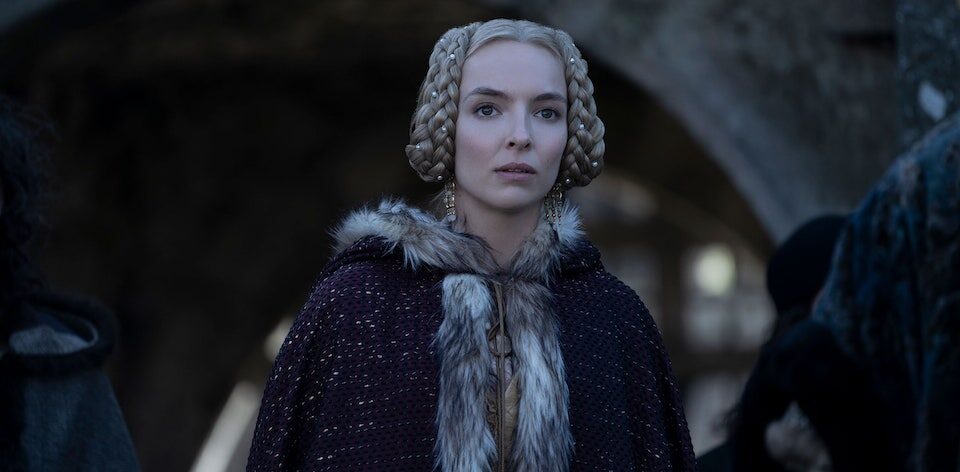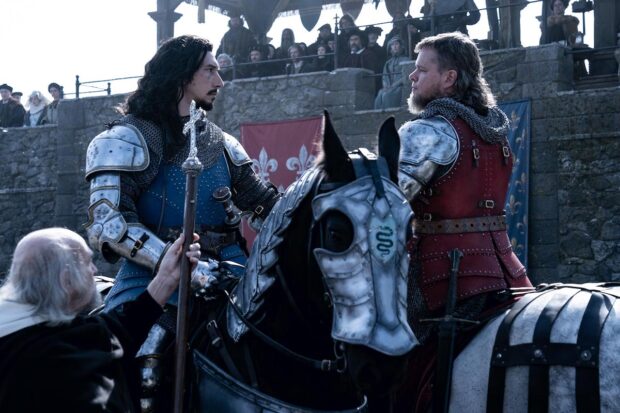Ridley Scott is one of those filmmakers who have been a part of the cinematic landscape for so long that we occasionally take him for granted. After a duo of films in 2017, the curious Alien: Covenant and the troubled All the Money in the World, all eyes are fixed on the high-profile House of Gucci due out later next month.
Then there’s this, an adaptation of Eric Jager’s non-fiction book, a film that’s almost slipped in under the wire. Set in 14th century France, during the reign of Charles VI, it begins with preparations of a trial by duel. We are then transported back several years, to learn how Marguerite de Carrouges (Jodie Comer) became the centre of an honour-based pissing contest between two men.
Divided into chapters, the first of these tells the perspective of Jean de Carrouges (Matt Damon), a soldier who has fallen out of finance and favour with Count Pierre d’Alençon (Ben Affleck), to whom he has sworn fealty. He marries Marguerite in an attempt to restore his finances, while asking friend and confident Le Gris (Adam Driver) to aid him. Yet at every turn, Le Gris appears to betray Jean, culminating in Le Gris being charged with the rape of Marguerite.
Damon and Affleck, writing together for the first time since Good Will Hunting (1998), collaborate with Nicole Holofcener (Friends with Money, Can You Ever Forgive Me?) on a Rashomon style script. Jean, Le Gris and finally Marguerite offer their perspectives on the rape of Marguerite in turn. Each version has some commonalities, but all diverge when it comes to the true nobility of the individual.
Which, despite the impressive photography (from regular Scott collaborator Dariusz Wolski) and phenomenal sound mix, is essentially a three-way character study. It may be a hammer-subtle transplant of #MeToo discussions into the 14th century, but as the extent of systemic discrimination against women is laid out — and mirrors many of the issues the movement is still trying to deal with today — it’s clear some audiences are well past that subtlety. Indeed, as more stories come out from the casting couches of Hollywood, the way Count Pierre runs his court as a harem sometimes feels all too recent.
“There is no right. There is only the power of men.”
While there’s an argument to be made that the writers casting themselves is a wee bit of hubris, Damon in particular disappears into the role and confirms that the mullet was an accursed entity in all time periods. Yet it’s Killing Eve star Comer, most recently seen in Free Guy, who give the strongest central performance. The narrative might continually rob her of agency, but the actor confidently steps into an award-worthy performance.
If you’ve made it this far into the review, then you know more about the film than I did going into it. In fact, this was the first time in ages that I went into a film knowing very little about it, and was completely enveloped by the experience. Although one has to wonder if the multiple perspectives approach will hold up on a repeat viewing, this is still one of Scott’s most visually arresting narratives in a while.
2021 | USA/UK | DIRECTOR: Ridley Scott | WRITER: Nicole Holofcener, Ben Affleck, Matt Damon | CAST: Matt Damon, Adam Driver, Jodie Comer, Ben Affleck | DISTRIBUTOR: 20th Century Studios | RUNNING TIME: 153 minutes | RELEASE DATE: 21 October 2021 (AUS), 15 October 2021 (US)






